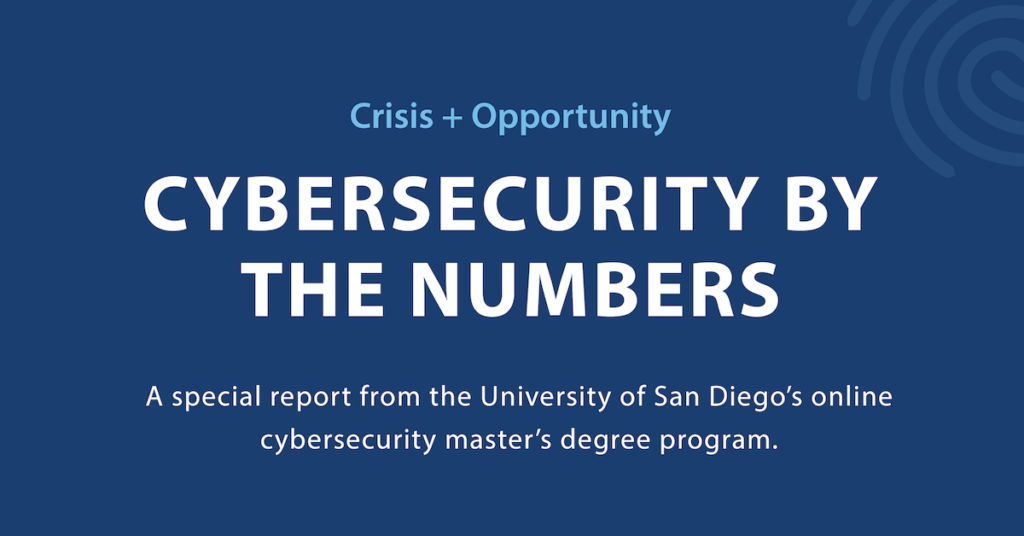If you are considering furthering your career and are interested in a master’s degree in cybersecurity, there could not be a better time to enter or advance in the field. The job outlook is fantastic, cybersecurity salaries are high and demand is soaring.
To land some of the best jobs in cybersecurity with the best companies, a master’s degree is often preferred and sometimes required. Whether you’re just getting started or looking to advance your career, a master’s degree can help ensure high pay, job security and expanded career opportunities.
Some of the largest companies in the country have been victims of cybercrime, including Facebook, Equifax and Home Depot among countless others. Government agencies are also a prime target, with a list of victims that includes the IRS, the FBI, the NSA, Department of Defense and the Department of Homeland Security.
In response, there has been a sharp uptick in the demand for cybersecurity professionals across almost every sector. This spike in demand has caused a severe talent shortage. And this high demand for talent, coupled with extraordinarily high stakes posed by the ongoing threat of cybercrime, means six-figure salaries are common throughout the industry.
Cybersecurity Job Outlook
If there ever was a time to enter the cybersecurity field, it’s now. With cyber threats and attacks continuing to increase, the demand for cybersecurity professionals is far outpacing the supply. The (ISC)2 (System Security Certification Consortium) Cybersecurity Workforce Study states that in 2021 there were over 2.72 million unfilled cybersecurity jobs globally.
Looking specifically at the position of information security analyst, the U.S. Bureau of Labor Statistics reports job growth of 33%, much faster than in other industries. The BLS cites an annual median salary of $102,600 for information security analysts, noting that the highest 10% earned more than $165,920.
Where are the Jobs Concentrated?
The increase in demand has been the greatest in industries managing increasing volumes of consumer data such as Finance (+137% cybersecurity job growth over the last five years), Health Care (+121% cybersecurity job growth) and Retail Trade (+89% cybersecurity job growth).
Texas has the highest number of cybersecurity job postings of any state in the U.S., with 67,439 total job postings for cybersecurity professionals, according to recent data. Trailing closely are California, Virginia, Maryland, New York, Florida, North Carolina and Illinois. California and the Washington D.C./Virginia/Baltimore, Md., area have become the leading cybersecurity hubs in the nation due to the national security and defense agencies that already exist there.
In San Diego, more than 874 cybersecurity-related firms account for some 24,349 local jobs and an estimated annual economic impact of $3.5 billion. The city is also home to one of the nation’s leading cybersecurity master’s degree programs at the University of San Diego.
In response to the urgency for increased cybersecurity education and talent and the growing need for collaboration between the public and private sector to fight cybercrime, the city is also home to the Cyber Center of Excellence (CCOE), a public-private partnership founded by a collection of world-class cyber companies with operations in San Diego.
See What a Cyber Security Masters Program Looks Like for Working Professionals
Cyber Security Salaries and Career Opportunities
Cyberseek.org, an outstanding resource for cybersecurity job seekers, offers an elaborate profile of the U.S. cybersecurity employment landscape, complete with a Cybersecurity Career Pathway section that offers continually updated information and average salaries for such key cybersecurity jobs as:
- Cybersecurity analyst — $100,603
- Cybersecurity consultant — $87,753
- Penetration & vulnerability tester — $101,231
- Cybersecurity engineer — $105,349
- Cybersecurity manager/administrator — $101,802
- Cybersecurity architect — $146,144
- Computer Network Architect — $120,520*
- Computer Programmer —$93,000*
- Information Security Analyst — $102,600*
- Systems Developer (Software Developer) — 110,140*
- Firewall Engineer — $122,0554**
*Salaries from the U.S. Bureau of Labor Statistics
**Salary found from ZipRecruiter
[RELATED] Which Cyber Security Program is Right For You? Download our free infographic to help decide >>
But no matter what industry you work in, if you are an experienced and educated cybersecurity professional, companies want you, both in the private and public sector. And they want you today, as the severe lack of talent in the war on cybercrime continues to threaten every person and business across the United States and world. Because of this, career opportunities can be found in:
- Private companies across all industries
- Government: federal, state, county and local agencies.
- Law enforcement
- Media
- Education
- Cybersecurity insurance
- Software development
- Cybersecurity training
- Consultants/freelancers: including penetration testers and bug bounty hunters
The Cyberseek.org resource cited above also offers information related to how earning a master’s degree in cybersecurity engineering or in operations and leadership can help position you for success. (Example: 22% of those hiring for a cybersecurity consultant role required candidates to hold a master’s degree.)
Cybersecurity Annual Salaries by State
| Average | California | Maryland | Georgia | New Jersey | Illinois | Rhode Island | Minnesota | Massachusetts | Texas | Missouri | New York | Colorado | Virginia | Oregon | |
| Information security analyst | $102,600 | $135,200 | $126,110 | $107,190 | $123,610 | $112,830 | $51,600 | $106,280 | $112,360 | $101,800 | $95,010 | $133,210 | $109,120 | $121,940 | $110,740 |
| Network Administrator | $80,400 | $105,770 | $106,480 | $90,450 | $108,860 | $91,930 | $93,220 | $90,340 | $102,990 | $89,630 | $85,760 | $102,480 | $93,550 | $98,810 | $93,180 |
| Computer network architect | $12,500 | $129,240 | $136,520 | $122,410 | $139,990 | $124,940 | $138,530 | $121,210 | $131,910 | $115,840 | $107,840 | $128,230 | $124,800 | $136,710 | $113,840 |
| Database Administrator | $103,570 | $106,250 | $100,350 | $88,920 | $124,930 | $97,700 | $107,040 | $95,910 | $113,750 | $98,910 | $87,580 | $107,260 | $98,780 | $100,930 | $97,980 |
| Computer Programmer | $88,150 | $114,740 | $95,830 | $100,670 | $107,480 | $91,060 | $98,720 | $94,590 | $108,980 | $80,950 | $77,830 | $93,510 | $100,310 | $112,890 | $97,700 |
| Software Developer | $115,550 | $146,770 | $131,240 | $114,740 | $124,100 | $109,970 | $128,790 | $111,400 | $128,190 | $111,830 | $100,290 | $129,950 | $120,140 | $127,830 | $115,160 |
The data in this chart was compiled from the U.S. Bureau of Labor Statistics’ Occupational Outlook Handbook.
What Makes Someone a Good Fit for a Master’s in Cybersecurity?
It’s clear that there is a growing and urgent need for cybersecurity professionals, and that those who are looking for a fulfilling career in the field can benefit from a master’s degree. Many higher-paying positions are available for professionals with advanced degrees. Master’s degree programs equip professionals with comprehensive knowledge, making degree holders more valuable to their current and future employers.
Bottom Line: Is a Cybersecurity Master’s Degree Worth It?
Of course, not all cybersecurity jobs require a master’s degree; however, the benefits of earning your degree are considerable:
- You’ll develop sought-after technical and industry leadership skills
- Valuable networking opportunities are built in
- You will have a competitive edge in the robust cybersecurity job market
- Your job security is practically guaranteed (since the field is experiencing a zero percent unemployment rate)
- And perhaps most important, your earning potential increases significantly
Additional Top Cybersecurity Jobs
Chief Information Security Officer (CISO)
–
For more information:
Master of Science in Cyber Security Operations and Leadership | University of San Diego
Master of Science in Cyber Security Engineering | University of San Diego




